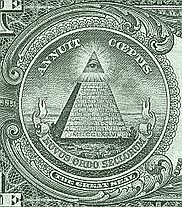Conspiracy theory
explanation that invokes a conspiracy From Wikipedia, the free encyclopedia
Remove ads
A conspiracy theory is a story that says that a group of people (called "conspirators") have agreed ("conspired") to engage in illegal or malicious actions and hide them from the public.



Remove ads
Overview
Conspiracy theories usually have little or no credible evidence. Distorted history based on conspiracy theories is sometimes called pseudohistory (pseudo- : from Greek ψευδής, "false").[2][3] People who promote pseudohistory are called historical revisionists,[2][4] or simply revisionists.[2][4] Some claim that historical events like the Holocaust or the Moon landing were faked by "conspirators".[2]
Remove ads
Examples
There are many conspiracy theories, including:
- 9/11 conspiracy theories
- UFO conspiracy theories
- Chemtrail conspiracy theory
- Moon landing conspiracy theories
- Assassination of John F. Kennedy conspiracy theories
- Illuminati and Freemasonry-conspiracy theories
- Death of Diana, Princess of Wales conspiracy theories
- Flat Earth
Some of these theories - like the idea that the Earth is flat - are irrational because there is so much evidence proving that they are wrong.[2]
Remove ads
Proliferation
Digital age
Conspiracy emerged as a cultural phenomenon in the United States of the late 20th and early 21st centuries.[2][5] In recent years, there has been an increase in the number of conspiracy theories discussed on the Internet. Theories that once had few followers can become well-known through the mass media.
Conspiracy theorists get paid by websites according to how many viewers they attract. Websites that seem free to the user are paid for by adverts, usually quite harmless, though they may be annoying. The people who post individual articles get paid once the number of viewers exceeds a certain qualifying number.[source?]
Critique
David Grimes has calculated that it takes at least three years to expose a conspiracy theory on the internet,[6] depending on the number of people involved.[6] Many conspiracy theories are exposed in three to four years.[2][6]
Related pages
References
Wikiwand - on
Seamless Wikipedia browsing. On steroids.
Remove ads
